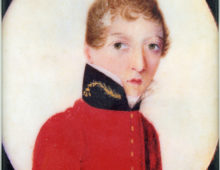News
New film explores the medical museum at Mont-Saint-Jean Farm
March 21, 2018 - Richard Moss
A new film produced by the University of Portsmouth promotes the new medical museum at Mont-Saint-Jean Farm, the famous site of the British field hospital at the Battle of Waterloo When one considers the great advances in surgery that have been achieved on the back of battlefield medicine, it is perhaps surprising that the […]
The Surgeon’s Blade: The Sad Case of Captain St Pol
February 9, 2018 - Mick Crumplin
Mick Crumplin’s latest medical blog is the gory tale of an officer who refused to have his leg amputated St Pol, an officer in the 7th or Royal Fusiliers was about to scramble up the great breach at Badajoz, during the furious and multiple assaults on that place on the night of 6 April, 1812. […]
The Surgeon’s Blade: John Hunter, Father of Scientific Surgery
December 15, 2017 - Mick Crumplin
Mick Crumplin’s latest medical blog features the great scientific surgeon, John Hunter In the history of Britain, Scotland has a right to stand proud of its disproportionate contribution to our nation’s growth and reputation. Through the Age of Scottish Enlightenment and systematically making provision for educating its youth in parish schools and universities, Scotland injected […]
The Surgeon’s Blade: Lieutenant George Simmons ‘Most Dangerous Wound’
November 2, 2017 - Mick Crumplin
Mick Crumplin continues his medical blog with the story of the terrible suffering and survival of a young officer in the Peninsular Wars and at Waterloo It is nigh impossible to imagine how much this young officer suffered after being desperately wounded at the Battle of Waterloo. He was incredibly fortunate to have survived. George […]
The Surgeon’s Blade: How Nelson lost his arm
September 5, 2017 - Mick Crumplin
Mick Crumplin continues his Napoleonic era medical blog by looking at Nelson’s trauma at Tenerife Lord Nelson was a leader both inspirational and impetuous in style. He would often pay a price for these traits. In the early years of the Napoleonic war, the Royal Navy was having considerably more success than the nation’s land […]
The Surgeon’s Blade: Leeches, humours and Napoleon’s piles
August 18, 2017 - Mick Crumplin
Mick Crumplin continues his medical blog by looking at the use of leeches in medicine and their use prior to the Battle of Waterloo The practice of bleeding patients was used through centuries. It was based on the Galenic theory of the balance of the four humours of the body (blood, phlegm, black and yellow […]
Famous Guide at Waterloo
August 16, 2017 - The Chairman
Through one of Waterloo 200’s associations with the website, The Online Book Company, a fascinating story has come to light. A lady in the United States has unearthed her ancestor as Joseph Munday who was a friend of Sergeant Cotton and took over his guiding business on the battlefield of Waterloo when Cotton died in […]
Wellington Obelisk
August 14, 2017 - The Chairman
I was in Dublin last weekend delving into family history and in the process passed through Phoenix Park where there stands a magnificent obelisk, allegedly the largest in Europe as it stands at 203 feet tall. It is most impressive. The obelisk was designed by the architect Sir Robert Smirke and the foundation stone was laid […]
Waterloo Deacon
August 2, 2017 - The Chairman
A couple of months ago a piece in Charles Moore’s column in the Spectator raised the issue of battle names used as christian names. Alma was certainly one and is still in use, Inkerman was used too but apparently Balaclava not so. But Charles Moore mentions the story of Waterloo Deacon. The heavily pregnant Martha Deacon […]
Jane Austen and Waterloo
July 29, 2017 - The Chairman
It is well known that Jane Austen shunned the subject of Waterloo and Napoleon which dominated society during the latter part of her life but a venturesome novelist has decided to write a novel entitled ” Jane and the Waterloo map”. Sounds interesting but it is probably pretty doubtful stuff. However it is quite topical as […]


